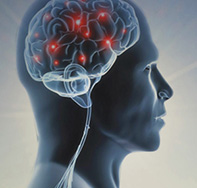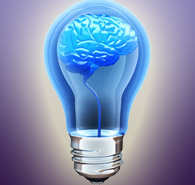Archive for the ‘Clinical Symptoms’ Category
Thursday, September 10th, 2015
By Siegfried Othmer, PhD
 The National Academies Press has just published a volume on the topic of the huge unmet burden of neurological disorders. The report covers a recent workshop dedicated to this topic. Appraising the state of affairs is the relatively easy part of the task: The National Academies Press has just published a volume on the topic of the huge unmet burden of neurological disorders. The report covers a recent workshop dedicated to this topic. Appraising the state of affairs is the relatively easy part of the task:
”…malfunctions in the central nervous system (CNS) instigate a wide range of devastating symptoms. The associated illnesses include developmental, psychiatric, and neurodegenerative illnesses, many of which are chronic and cause serious and long-lasting disabilities. Together, they are extremely prevalent and have an enormous impact from cradle to grave.”
(more…)
Posted in Clinical Symptoms | 7 Comments »
Thursday, August 5th, 2010
 The Dysponesis Hypothesis The Dysponesis Hypothesis
We are always casting about for better ways to frame the work that we do in order to make it comprehensible to other professionals and lay persons. Sometime it helps to dip into past history to see how others wrestled with the same issue. One notion that has threaded its way through is that of simple inefficiency in brain regulatory function, which naturally leads to the suggestion that our training improves regulatory effectiveness through promoting higher efficiency in the regulatory mechanisms. It’s a simple concept with a certain amount of face validity, and also offers the virtue of vagueness where we are still uncertain about the details. Another slightly different theme is that the brain sometimes works against itself, that its efforts to right the ship are sometimes counter-productive.
The term dysponesis encompasses a variety of dysfunctions in which the CNS operates counter to the desired end-result. In considering the possible utility of this term in modern parlance, I am going back to an article written by George Whatmore and Daniel Kohli back in 1968 (Behavioral Science, 13(2), 102-124, (1968)), and reprinted as a book chapter in the text Mind/Body Integration (Erik Peper, Sonia Ancoli, and Michelle Quinn, editors), which was first published in 1979. The authors were two physicians in private practice.
(more…)
Posted in Application of Neurofeedback, Biofeedback, Clinical, Clinical Results, Clinical Symptoms, Disregulation, Neurofeedback, Research, Scientific | 4 Comments »
Saturday, December 12th, 2009
 The issue of sudden, rapid acceleration in Toyota vehicles presents an interesting case study of how our society approaches rare hazardous events, and a consideration of this history can shed light on how other such instances are handled that are of more direct interest to us here. It turns out that this issue has been with us for some time. About 1000 suspicious acceleration events have been recorded over eight years, with some 19 deaths registered in Toyotas since 2002. The issue of sudden, rapid acceleration in Toyota vehicles presents an interesting case study of how our society approaches rare hazardous events, and a consideration of this history can shed light on how other such instances are handled that are of more direct interest to us here. It turns out that this issue has been with us for some time. About 1000 suspicious acceleration events have been recorded over eight years, with some 19 deaths registered in Toyotas since 2002.
Complaints of sudden, unintended acceleration rose rapidly after Toyota replaced mechanical throttles with electronic controls in 2002. By the time that this problem received significant attention, however, the hypothesis of causation by floor mats interfering with the gas pedal was well entrenched. So that hypothesis continued to be advanced even after it ceased to be very credible. After all, the problem occurred even in vehicles where the floor mats had been removed, and where nothing was engaging the gas pedal (as at a stoplight). As recently as a few months ago, our National Highway Safety Administration saw no reason to inquire beyond the mundane hypothesis involving floor mats. And the recall of 4.2 million cars is majorly targeted to the replacement of gas pedals so that they will be less confused by the floor mats.
(more…)
Posted in Application of Neurofeedback, Autism, Commentary, Neurofeedback | 4 Comments »
Saturday, August 29th, 2009
 We should be grateful, I suppose, that autism is now finally getting attention from the medical community. As late as the 1990’s, parents were still being blamed for the condition by their pediatricians. And until recently the attempts by DAN doctors (Defeat Autism Now) to get at the medical roots of the condition were mocked by their medical colleagues. But the developing mainline approach to autism exhibits the tendencies typical for modern medicine, which is to target the symptoms rather than the condition that gives rise to them. We should be grateful, I suppose, that autism is now finally getting attention from the medical community. As late as the 1990’s, parents were still being blamed for the condition by their pediatricians. And until recently the attempts by DAN doctors (Defeat Autism Now) to get at the medical roots of the condition were mocked by their medical colleagues. But the developing mainline approach to autism exhibits the tendencies typical for modern medicine, which is to target the symptoms rather than the condition that gives rise to them.
What follows is an actual case description of the treatment of sleep disorder and self-injurious behavior in the Child and Adolescent Psychopathology Department of Sainte-Anne’ s Hospital. One of the children presenting with severe autistic behavior exhibited persistent sleep disorder and motor instability even with the standard multidisciplinary program at the hospital. This led to successive prescriptions of several different psychotropic drugs:
(more…)
Posted in Application of Neurofeedback, Autism, Clinical Symptoms, Efficacy, Neurofeedback | 2 Comments »
Tuesday, November 6th, 2007
 One of the maddening aspects of the dismissal of the environmental hypothesis for autism is that the counter-evidence provided is never allowed to be seen in context. The environmental hypothesis is rejected in favor of an ostensibly “pure” genetic hypothesis and that’s that. Evidence for the genetic hypothesis—which is indeed plentiful—is allowed to displace the environmental hypothesis as if the one excluded the other. One of the maddening aspects of the dismissal of the environmental hypothesis for autism is that the counter-evidence provided is never allowed to be seen in context. The environmental hypothesis is rejected in favor of an ostensibly “pure” genetic hypothesis and that’s that. Evidence for the genetic hypothesis—which is indeed plentiful—is allowed to displace the environmental hypothesis as if the one excluded the other.
It is of course much more “ecological” to assume that just as the genetics of autism is turning out to be complex, environmental influences are likely to be complex as well. Ruling out environmental factors is not at all a trivial matter, and epidemiology is not up to the task. We are now aided in this discussion by a new study just published in the American Journal of Biochemistry and Biotechnology {4(2), 73-84 (2008!)}. The lead author, Elizabeth M. Sajdel-Sukowska, is at the Harvard Department of Psychiatry.
The overarching model is that oxidative stress wreaks havoc with brain function; mercury contributes famously to such oxidative stress; and the autistic brain may have difficulty with detoxing mercury itself, or it may have difficulty with mounting counter-measures, as with anti-oxidants such as selenium and glutathione.
(more…)
Posted in Autism, Research | 1 Comment »
Wednesday, August 1st, 2007
Sense and Nonsense about Autism: Beyond Genetics
 “Autism is currently, in our view, the most important and the fastest-evolving disorder in all of medical science and promises to remain so for the foreseeable future.” —-Dr. Jeffrey A. Lieberman, chairman of the department of psychiatry at Columbia University’s school of medicine. “Autism is currently, in our view, the most important and the fastest-evolving disorder in all of medical science and promises to remain so for the foreseeable future.” —-Dr. Jeffrey A. Lieberman, chairman of the department of psychiatry at Columbia University’s school of medicine.
A few months back David Kirby (author of the book “Evidence of Harm”) interviewed Katy Wright about her autistic child Christian, and more specifically the recovery that he was beginning to make with biomedical treatments that have been developed over the years by the MDs and Ph.D.s involved with the organization Defeat Autism Now (DAN). (http://www.autismmedia.org/media15.html)
Katy makes no bones about what she believes happened to her son: “I believe that Christian’s regression and subsequent autism was the result of receiving six vaccines during one office visit at two months of age,” she wrote. “He screamed for twelve hours and had a 104 degree fever nearly the entire time. His vaccines contained thimerosal,” the mercury-based preservative. “It is devastating,” she added, “because so much of this is preventable.” (more…)
Posted in Autism, Commentary, Diagnoses, Professional Issues, Research, Scientific | No Comments »
|
|
Subscribe to Email Newsletter
The EEG Info Newsletter circulates via email at least once a month. A variety of topics related to the Neurofeedback / EEG Biofeedback field are covered in over 200 articles.
|
 The National Academies Press has just published a volume on the topic of the huge unmet burden of neurological disorders. The report covers a recent workshop dedicated to this topic. Appraising the state of affairs is the relatively easy part of the task:
The National Academies Press has just published a volume on the topic of the huge unmet burden of neurological disorders. The report covers a recent workshop dedicated to this topic. Appraising the state of affairs is the relatively easy part of the task:

 We should be grateful, I suppose, that autism is now finally getting attention from the medical community. As late as the 1990’s, parents were still being blamed for the condition by their pediatricians. And until recently the attempts by DAN doctors (Defeat Autism Now) to get at the medical roots of the condition were mocked by their medical colleagues. But the developing mainline approach to autism exhibits the tendencies typical for modern medicine, which is to target the symptoms rather than the condition that gives rise to them.
We should be grateful, I suppose, that autism is now finally getting attention from the medical community. As late as the 1990’s, parents were still being blamed for the condition by their pediatricians. And until recently the attempts by DAN doctors (Defeat Autism Now) to get at the medical roots of the condition were mocked by their medical colleagues. But the developing mainline approach to autism exhibits the tendencies typical for modern medicine, which is to target the symptoms rather than the condition that gives rise to them. One of the maddening aspects of the dismissal of the environmental hypothesis for autism is that the counter-evidence provided is never allowed to be seen in context. The environmental hypothesis is rejected in favor of an ostensibly “pure” genetic hypothesis and that’s that. Evidence for the genetic hypothesis—which is indeed plentiful—is allowed to displace the environmental hypothesis as if the one excluded the other.
One of the maddening aspects of the dismissal of the environmental hypothesis for autism is that the counter-evidence provided is never allowed to be seen in context. The environmental hypothesis is rejected in favor of an ostensibly “pure” genetic hypothesis and that’s that. Evidence for the genetic hypothesis—which is indeed plentiful—is allowed to displace the environmental hypothesis as if the one excluded the other. “Autism is currently, in our view, the most important and the fastest-evolving disorder in all of medical science and promises to remain so for the foreseeable future.” —-Dr. Jeffrey A. Lieberman, chairman of the department of psychiatry at Columbia University’s school of medicine.
“Autism is currently, in our view, the most important and the fastest-evolving disorder in all of medical science and promises to remain so for the foreseeable future.” —-Dr. Jeffrey A. Lieberman, chairman of the department of psychiatry at Columbia University’s school of medicine.
The Rare Event: Toyota, Tasers, and Autism
Saturday, December 12th, 2009Complaints of sudden, unintended acceleration rose rapidly after Toyota replaced mechanical throttles with electronic controls in 2002. By the time that this problem received significant attention, however, the hypothesis of causation by floor mats interfering with the gas pedal was well entrenched. So that hypothesis continued to be advanced even after it ceased to be very credible. After all, the problem occurred even in vehicles where the floor mats had been removed, and where nothing was engaging the gas pedal (as at a stoplight). As recently as a few months ago, our National Highway Safety Administration saw no reason to inquire beyond the mundane hypothesis involving floor mats. And the recall of 4.2 million cars is majorly targeted to the replacement of gas pedals so that they will be less confused by the floor mats.
(more…)
Posted in Application of Neurofeedback, Autism, Commentary, Neurofeedback | 4 Comments »